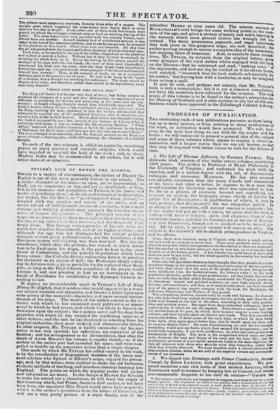PROGRESS OF PUBLICATION.
THE continuing rush of new publicatious prevents us from bring- ing up so many arrears, or from noticing so many productions of the week, as inclination would have prompted. We will, how. ever, do the next best thing we can both for the reader and the books : we will endeavour to present a general idea of the subject and scope of those volumes which appear to require a closer ex- amination and a longer notice than we can yet bestow, so that they may be required with better reason to wait for the fulness of time.
1. The Life of Thomas Jefferson, by GEORGE TUCKER. This elaborate work consists of two bulky octavo volumes, containing 1200 pages. The author is Professor of Mural Philosophy in the University of Virginia ; and undertook his work with the sanction, and to a certain degree with the aid, of JEFFERSON'S colleague and successor, MADISON. He has also received considlrable assistance from the many friends and connexions of his hero; and what is better, lie appears to be a man who would exercise his discretion upon what was submitted to him. So far us a glance, of necessity hurried and superficial, can warrant an opinion, the biography seems chiefly to Lentil° the public nib of JEFFERSON; in justification of' which, it may be said, perhaps, that JEFFERSON'S life was altogether public. In speaking of its execution, still greater caution is requisite ; but, it the reader will put up with a guess, we opine that the work is written with mose of temper, spirit, and elegance, than or cha- racteristic touches, and that its leanings are in favour of Jiteen- sox and Democracy, though not so marked as to be turned par- tial. Of its style, a general extract will convey an idea. The subject is JEFFERSON'S bill to abolish primogeniture in Virginia, and its effects.
Thug, there were formerly many in Virginia who drove a coach and sir. and now such an equipage is never seen. 'there were probably twiee or three times as 'natty four. horse carriages before the Revolution as there are at present; but the number of two-horse carriages may be now ten, or even twenty times as great as at the former petiod. A few families too could boast of more plate than can now be met with ; but the whole quantity in the country has increased twenty, if not fifty fold. Some nice but querulous observers have thought that they perceived a corre- spondent change itt the manners and intellectual cultivation of the two periods; and while they admit that the mass of time people may he now less gross and more intelligent than the backwoodsman, the tobacco roller,* or the rustle population generally, under the regal government ; yet they insist, that we now have no such class as that which formerly constituted the Virginia gentleman, of chivalrous honour and pulished manners—at once high. minded, liberal, delicate, and munificent ; and that, as to mental cultivation, our beat-educated men of the present day cannot compare with the Lees, the Raudolphs, the Jeffersons, Pendletons, and Wythes, of that pet iod. This comparison, however, cannot easily be made with fairness; for there are few who have lived long enough to compare the two periods, and those few are liable to be biassed on one side or the other, according to their early predilec- tions and peculiar tastes. But apart from these individual influences, there is a genet al one to which we are all exposed. Time throws a mellow tight over out recollections of the past, by which their beauties acquire a more touching softness, and their harsher parts are thrown into shade. Who that consults his reason can believe, if those scenes of his early days, to which he most foadly looks back, were again placed before him, that he would again see them suck as memory depicts them: leis more discriminating eye and his lees excitable sensibility, would now see faults which then escaped hue inexperience ; and hs would look tranquilly, if nut with indifference, on what had once produced intoxication of delight. Yet, such is the comparison which every one must make between the men and things of his early and his later life ; and the traditionary accounts of a yet earlier period are liable to time same objection; far they all originate with those who ieecribe what they remember, rather thu what they actually observed, We must therefore make a liberal allowance fir this common illusion, when we are told of the superior virtues and accomplish- ments of our ancestors.


























 Previous page
Previous page